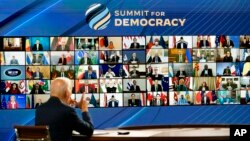Pakistan on Tuesday declined to attend the second Summit for Democracy, hosted this week by the United States, saying it would instead engage bilaterally with Washington on democracy.
The Biden administration has invited 120 countries, civil society groups and technology companies to attend the summit on Wednesday, with Costa Rica, South Korea, Zambia, and the Netherlands co-hosting.
A Foreign Ministry statement in Islamabad thanked Washington for the invitation but did not specify any reasons for skipping the event. However, critics attributed the exclusion of longtime ally China from the event as a likely reason for Pakistan to opt out, as it did when Biden hosted the first summit in December 2021.
Islamabad does not want to upset its “all-weather friend” Beijing, Pakistani English-language Dawn newspaper reported. Turkey, which maintains close ties with Pakistan, also has not been invited to this week’s gathering in Washington.
"The summit process is now at an advanced stage, and therefore, Pakistan would engage bilaterally with the United States and co-hosts of the summit to promote and strengthen democratic principles and values and work toward advancing human rights and the fight against corruption," the statement said.
It stressed that Prime Minister Shehbaz Sharif's government values Pakistan's friendship with the United States.
"Under this Biden administration, this relationship has widened and expanded substantially, the statement said.
Maleeha Lodhi, a former Pakistani ambassador to Washington, defended Islamabad's decision to avoid the event.
"Correct decision. The summit idea is driven by America's contain-China strategy. And inviting Taiwan made it even more impossible for Pakistan to attend,” she said on Twitter.
Some in Pakistan saw the U.S. summit as an opportunity for the Sharif administration to secure Washington's crucial support in persuading the International Monetary Fund to resume lending to the cash-strapped nation as it faces an economic meltdown.
Sharif told the parliament Tuesday that the IMF wants external financing commitments fulfilled from friendly countries before it revives a bailout program to help Pakistan fund its balance of payments.
Madiha Afzal, a scholar at the Brookings Institution, said on Twitter that Pakistan's refusal to attend the summit "ostensibly because of China" does not align with Islamabad's assertions of seeking balanced ties with both world powers.
"This doesn't make sense for a country that says it wants good relationships with both China and the U.S.,” she wrote.
Pakistan's traditionally tumultuous relations with the United States have come under strain since August 2021 when American and allied troops chaotically withdrew from neighboring Afghanistan, and the insurgent Taliban took over the country.
Washington had long blamed Islamabad for covertly supporting the Taliban while they waged a deadly insurgency against U.S.-led international forces for two decades. However, the Biden administration has lately stepped up its engagement with the Pakistani government, leading to frequent visits by senior U.S. officials to Islamabad.
For its part, China has in recent years cemented its defense and economic ties with Pakistan, investing billions of dollars in the South Asian neighbor under its Belt and Road Initiative to build roads, power plants and ports.
Human rights
The U.S. summit comes amid allegations that the Sharif government is curtailing peaceful assembly, stifling freedom of speech and cracking down on former Prime Minister Imran Khan’s opposition political party to suppress demands for early elections.
Khan's Pakistan Tehreek-e-Insaf released a report Tuesday documenting alleged abuses against its supporters nationwide. The report said that hundreds of party leaders and workers had been detained, with some subjected to custodial torture and frivolously charged with terrorism, sedition and other criminal offenses since last April, when Khan was removed from office by a parliamentary no-confidence vote.
The country’s independent Human Rights Commission of Pakistan backed the opposition complaints.
The HRCP “denounces the strong-arm tactics and disproportionate use of force by the state as a means of political repression," the watchdog said in a statement Tuesday.
"We are deeply concerned to observe that this has involved resorting to the use of colonial laws of sedition, unwarranted charges of terrorism against political opponents, enforced disappearances, and attempts to gag freedom of expression through ill-conceived proposals and actions through PEMRA," the commission statement said.
The HRCP statement referred to the state-run Pakistan Electronic Media Regulator Authority, which has repeatedly barred Pakistani television news channels from airing Khan's speeches and news conferences despite court rulings against such attempts.
The regulator ordered TV stations on Monday not to air live or recorded coverage of rallies or public gatherings by any party, organization or individual in the Pakistani capital.
Amnesty International denounced the blanket ban as a "disturbing demonstration of how authorities continue to threaten press freedom" in Pakistan. "We urge PEMRA to immediately reverse this decision."











